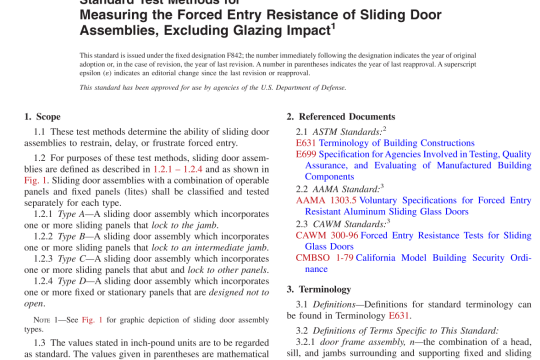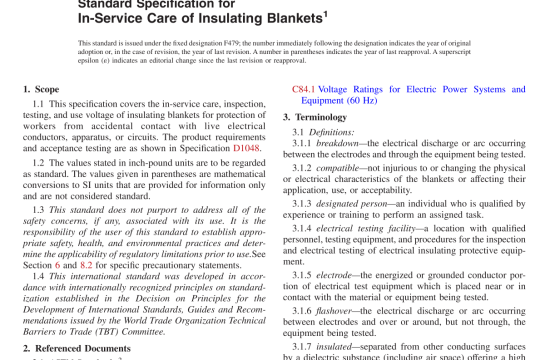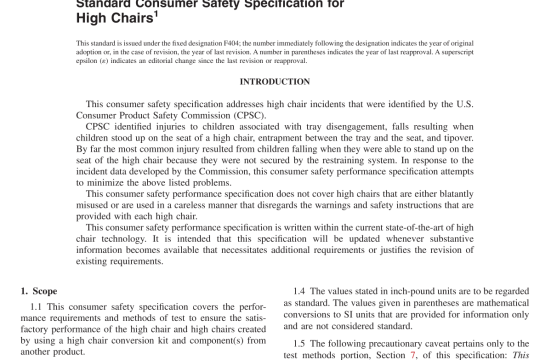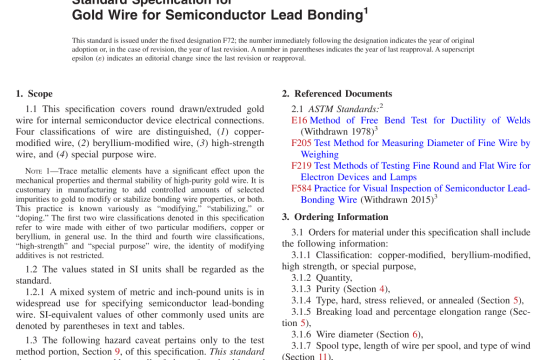ASTM D5798-2018 pdf free download
ASTM D5798-2018 pdf free download.Standard Specification for Ethanol Fuel Blends for Flexible-Fuel Automotive Spark- Ignition Engines
1. Scope
1.1 This specification covers the requirements for automo- tive fuel blends of ethanol and gasoline for use in ground vehicles equipped with ethanol fuel blend flexible-fuel spark- ignition engines. Fuel produced to this specification contains 51 % to 83 % by volume ethanol. This fuel is for use in flexible-fuel vehicles and is sometimes referred to at retail as “Ethanol Flex-Fuel.” Appendix X1 discusses the significance of the properties specified. 1.2 The vapor pressure of ethanol fuel blends is varied for seasonal climatic changes. Vapor pressure is increased at lower temperatures to ensure adequate flexible-fuel vehicle operabil- ity. Ethanol content and selection of hydrocarbon blendstock are adjusted by the blender to meet these vapor pressure requirements. 1.3 This specification formerly covered Fuel Ethanol (Ed70- Ed85) for Automotive Spark-Ignition Engines, also known commercially as E85. The nomenclature “fuel ethanol” has been changed to “ethanol fuel blends” to distinguish this product from denatured fuel ethanol Specification D4806. To facilitate blending of ethanol fuel blends that meet seasonal vapor pressure requirements, a new lower minimum ethanol content has been established. 1.4 The United States government has established various programs for alternative fuels. Many of the definitions of alternative fuel used by these programs may be more restrictive than the requirements of this specification. See 4.1.2.1 for additional information on alternative fuels containing ethanol. 1.5 The values stated in SI units are to be regarded as the standard. 1.5.1 Exception—The values given in parentheses are for information only.1.6 The following safety hazard caveat pertains only to the test method portion, 8.1.8, of this specification. This standard does not purport to address all ofthe safety concerns, ifany, associated with its use. It is the responsibility ofthe user ofthis standard to establish appropriate safety and health practices and determine the applicability ofregulatory limitations prior to use. 1.7 This international standard was developed in accor- dance with internationally recognized principles on standard- ization established in the Decision on Principles for the Development of International Standards, Guides and Recom- mendations issued by the World Trade Organization Technical Barriers to Trade (TBT) Committee.
3. Terminology
3.1 For general terminology, refer to Terminology D4175. 3.2 Definitions: 3.2.1 denaturants, n—materials added to ethanol to make it unsuitable for beverage use under a formula approved by a regulatory agency to prevent the imposition of beverage alcohol tax. 3.2.1.1 Discussion—Denaturants are only those materials added by the denaturer to comply with the approved formula; any materials absorbed later are not denaturants. D4806 3.2.2 denatured fuel ethanol—fuel ethanol made unfit for beverage use by the addition of denaturants under formula(s) approved by the applicable regulatory agency to prevent the imposition of beverage alcohol tax. D4806 3.2.3 ethanol, n—ethyl alcohol, the chemical compound C 2 H 5 OH. D4806 3.2.4 finished fuel, n—homogeneous mixture of blendstocks and fuel additives meeting all specification and regulatory requirements for its intended use at the location where sold. 3.2.5 gasoline, n—a volatile mixture of liquid hydrocarbons, generally containing small amounts of additives, suitable for use as a fuel in spark-ignition, internal combustion engines. D4814 3.2.6 hydrocarbon, n—a compound composed solely of hydrogen and carbon. 3.2.7 methanol, n—methyl alcohol, the chemical compound CH 3 OH. 3.3 Definitions ofTerms Specific to This Standard: 3.3.1 flexible-fuel vehicle, n—a vehicle designed to operate on either unleaded gasoline or ethanol fuel blends or mixtures of both. 3.3.1.1 Discussion—In the United States, these vehicles have U.S. EPA emissions certifications using gasoline comply- ing with U.S. EPA requirements and ethanol fuel blends that meet the requirements of Specification D5798. 3.3.2 hydrocarbon blendstock, n—a blending component composed of hydrocarbons which boil in the gasoline tempera- ture distillation range and trace amounts of naturally occurring compounds or additives composed of hydrogen, carbon, and other elements such as sulfur, oxygen and nitrogen.




